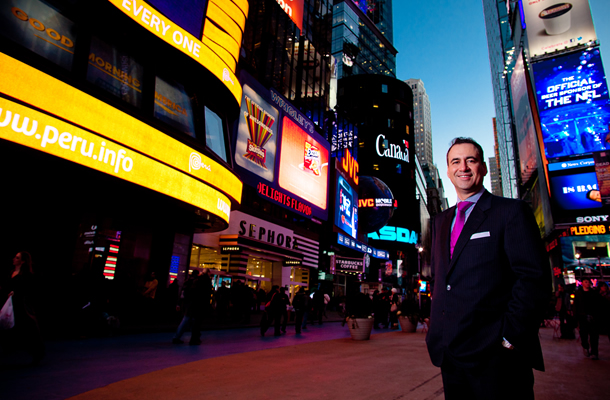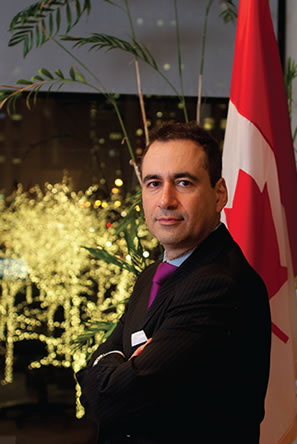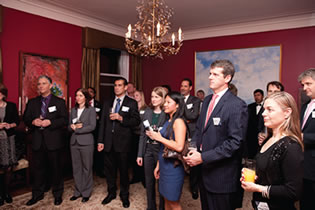Bay Street Meets Wall Street

John Prato, MBA’91, MPA’89, fielded his fair share of phone calls as Managing Director in the Equity Capital Markets Group at TD Securities. This former Bay Street insider had a direct line to many of the senior players in Canadian and international finance circles, including federal government officials who sought his views on the world’s economic turmoil after the financial crisis hit in 2008. He also traded calls with movers and shakers in Toronto’s cultural and philanthropic communities as a board member of the Royal Ontario Museum, St. Michael’s Hospital Foundation and the Canadian Foundation for AIDS Research. But the phone call he received in November of 2010 wasn’t from one of the usual suspects. This time it was the Prime Minister’s office calling. Would John be interested in a diplomatic posting as Canada’s Consul General in New York?
“It came as a complete shock and a total surprise,” he recalls. “I didn’t quite know how to respond, so I said I’d have to discuss it with my wife and get back to them.” He’d only just wed Lori Billinghurst, MD’01, the month before, surrounded by family and friends, including best man Craig Desjardins, MBA’91, and other classmates. The newlyweds’ new life together seemed ideal: John was nearing the 20-year mark with TD Bank Financial Group in a job he loved, and Lori was thriving as a pediatric neurologist. Then one phone call changed everything.
When he and Lori discussed the offer that evening, she said, “You may never have another chance to serve your country to this extent.” The New York Consulate employs a staff of nearly 100 at offices in the heart of midtown. Representing Canada in the one of the world’s financial capitals offered the ultimate opportunity to promote Canada’s interests. There was also a personal connection: John had proposed to Lori there in 2010, taking her to Ellis Island, where his grandfather had first arrived in North America from Italy before settling in Toronto.
That same evening the couple agreed the posting was an opportunity not to be missed, though it involved Lori foregoing her medical practice. After months spent wrapping up their responsibilities in Toronto and finalizing all the required paperwork, the couple moved into the Consul General’s official residence on Park Avenue in the heart of Manhattan in March.
 “New York is an incredible city and I feel privileged to be here at a unique time,” John says. The worldwide financial crisis continues to reverberate globally, and nowhere has its impact registered more strongly than in New York, arguably the financial capital of the world. While other countries, notably Greece, Italy, Ireland, Spain and even the US, have struggled, some with nearly cataclysmic consequences, Canada has weathered the storm. “Thanks to a well-regulated, well capitalized banking industry and the prudence demonstrated by Canadian lenders, our banks weathered the financial crisis without a single bank bailout or failure,” he explains. “For the fourth year in a row, the World Economic Forum rated Canada’s banking system the soundest in the world and five Canadian financial institutions were recently named to Bloomberg’s list of the world’s strongest banks—more than any other country.”
“New York is an incredible city and I feel privileged to be here at a unique time,” John says. The worldwide financial crisis continues to reverberate globally, and nowhere has its impact registered more strongly than in New York, arguably the financial capital of the world. While other countries, notably Greece, Italy, Ireland, Spain and even the US, have struggled, some with nearly cataclysmic consequences, Canada has weathered the storm. “Thanks to a well-regulated, well capitalized banking industry and the prudence demonstrated by Canadian lenders, our banks weathered the financial crisis without a single bank bailout or failure,” he explains. “For the fourth year in a row, the World Economic Forum rated Canada’s banking system the soundest in the world and five Canadian financial institutions were recently named to Bloomberg’s list of the world’s strongest banks—more than any other country.”
“We have a strong economic brand that comes from having managed our economy in a much better manner than most other western countries,” John says. “People are now looking to Canada and asking, ‘How have you been able to manage this financial crisis and perform better than most nations?’ When our Prime Minister and Finance Minister come to New York, they’ve been very well received. People want to hear what Canada has to say on a number of issues, but especially on economic ones.”
It’s little wonder that Canada wields serious economic clout in New York these days. The NY Consulate General’s area of responsibility encompasses New York City, Eastern New York State, New Jersey and Connecticut—a region with a population of 21 million people. Trade between Canada and the Tri-state
area (including all of NY State) has soared to US$50-billion, up almost 300% over a 12-year period. If this region were a country, it would be Canada’s second largest trading partner, the largest being the rest of the American states, combined.
“My role as Consul General is quite straight-forward,” John explains. “Simply put, it’s to promote, advocate for and strengthen Canada’s objectives in the Tri-state area.” While these objectives are many and include furthering Canada’s political, economic, cultural, security and immigration interests, there are three main priorities that occupy much of John’s time: finance and investment; energy and the environment; and border security and economic competitiveness.
His role regarding finance and investment involves gathering intelligence from the local financial community and conveying his analysis to officials in Ottawa. It’s the kind of unique insight that comes from meeting with senior executives in the financial community and those in the many think-tanks headquartered in New York. Access at the highest levels of the banking community also opens doors when the federal and provincial governments and Canadian businesses are looking to access capital from world lenders.
On the energy and the environment front, the NY Consul General is front and centre in putting forward Canada’s position on such initiatives as the Keystone Pipeline, the US$13-billion project that proposes to deliver crude oil from Alberta through the US heartland to refineries in the Gulf States. While this project continues to generate controversy and protests, fueled in part by concerns over greenhouse gases, John sees the opportunity for a teaching moment. “I highlight the number of jobs—some 400,000 we believe—that would be generated in the US related to our oil sands development initiatives.” Canada and the US also share similar views on the importance of protecting the environment. “I explain that Canada and the US have the same goals coming out of the UN environmental conferences in Cancun and Copenhagen,” he says. “We share the same objective—that is, a 17% reduction in greenhouse gas emissions by 2020, compared to 2005 as the base year—but we’ll do so differently than the Americans because our economy is different.”
Finally, in a post-9/11 world, border security and economic competitiveness are priorities of both the Canadian and US governments. President Obama and Prime Minister Harper signed a Memorandum in February 2011 to work on making the border more secure and less of an obstacle to international trade. “We realize there is a serious security component,” John explains, “but we also want to ensure that legitimate business is not stifled and that the border doesn’t become an impediment to economic growth.”
Managing these priorities that shape Canada’s relationship with its largest trading partner and closest ally is challenging in itself. Getting heard above the noise in the city that never sleeps adds another level of complexity. “Our biggest challenge is making an impression in a global city such as New York,” he concedes. Not only is the city a financial capital, with 86 Fortune 500 companies’ head offices and numerous North American headquarters of multinational corporations based there, it’s also home to international media conglomerates and the world’s largest concentration of diplomats, due to the presence of the United Nations.
 QSB alums at the reception hosted by John Prato at his official residence in December“We’re able to get attention these days because people are interested in Canada’s position on financial management,” he explains. “Our message has to be clear and focused, but it also has to be pertinent to US interests. You can’t just come here and advocate for something that’s very narrowly in Canada’s interest. By focusing on American interests and how they’re tied to ours, we’re able to break through and get noticed.”
QSB alums at the reception hosted by John Prato at his official residence in December“We’re able to get attention these days because people are interested in Canada’s position on financial management,” he explains. “Our message has to be clear and focused, but it also has to be pertinent to US interests. You can’t just come here and advocate for something that’s very narrowly in Canada’s interest. By focusing on American interests and how they’re tied to ours, we’re able to break through and get noticed.”
Jobs and economic recovery are top-of-mind issues on both sides of the border these days. John isn’t shy about quoting some impressive statistics that speak to the importance of the Canada-US relationship in fostering both. “Most Americans don’t realize that 35 of the 50 states have Canada as their #1 export market; or that 8 million US jobs depend on Canada-US relations.”
Promoting the Canada brand in a city as vibrant as New York has its perks. Within a week of starting his new job in March, John attended a screening of Québécois filmmaker Denis Villeneuve’s Oscar-nominated Incendies at the Museum of Modern Art and co-hosted a reception with the Delegate General of Quebec in New York. The next night, he and Lori attended a performance at Carnegie Hall by the Toronto Symphony Orchestra and rubbed shoulders with some of New York’s key decision-makers. “It doesn’t get any better than that in terms of advancing the partnership, especially here, in one of the cultural capitals of the world.”
A reception he hosted at his official residence for QSB alumni in December was on a smaller scale but no less important in John’s eyes. “My Queen’s experience was an incredible time in my life—the campus life, friends I met there, the quality of the education and the professors who really cared about you—I’ve never forgotten it.” One such professor was Bill Cannon, who John had the chance to see at a QSB Club event in NY shortly after the new diplomat’s arrival.
“I had to see my old finance prof, one of the strongest influences on my life. He used to have us memorize material, and we’d complain, ‘Why do we need to memorize all these things when we’ll have the books when we’re working?’ He replied, ‘When you’re in a meeting with a client and they ask questions about this, if you don’t know the answers without consulting a book, you’re not representing your firm well.’ He was right, and I’ve never forgotten it.”
Being prepared, knowing the ins and outs of a complex portfolio, is a lesson he has elevated to an even higher level now that he’s representing his country on the world stage.
Learn more about the Consulate General of Canada in New York.
